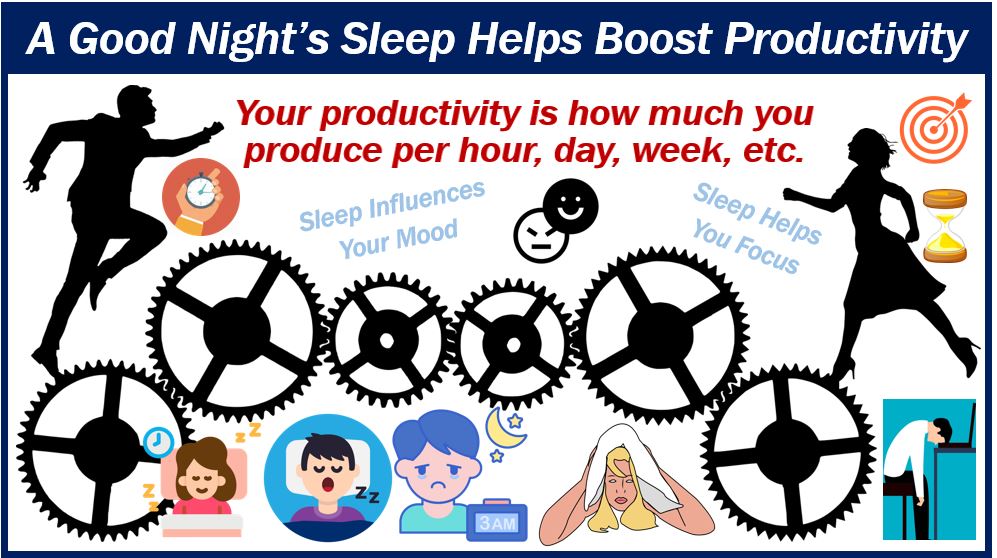Searching for an effective way to enhance your work productivity? Beyond to-do lists, calendars and coffee, a good night’s sleep will improve your productivity, mood, focus and concentration. For many people, getting a quality night’s sleep each night is easier said than done. Use these tips to sleep better and improve your productivity at work.

Benefits of Getting Enough Sleep
The quality of your sleep and work go hand-in-hand. Getting enough sleep improves your mood, health and quality of work. When you sleep, your body repairs itself. Your heart rate and blood pressure drop.
Fight Infections
Your body releases hormones that help your immune system vanquish infections. If you’re exposed to germs on the job, sleeping well lowers your risk of getting sick and helps you recover faster if you do become ill.
Better Mood
Your mood, mental health and cognitive functions improve when you get enough high-quality sleep. Your brain makes memories while you sleep. The neural connections made during sleep boost problem-solving skills and learning. You’ll wake up feeling fresh and energetic.
What Is Sleep Deprivation?
Sleep deprivation is a lack of sleep. Most adults need seven to eight hours of uninterrupted sleep nightly. About 35% of American adults get less than that. Nearly 70% say they’re regularly sleep-deprived. Sleep deprivation is common among shift workers, those with two or more jobs and caregivers. Untreated sleep deprivation is associated with sleep and anxiety disorders.
Symptoms of Sleep Deprivation
Sleep deprivation symptoms vary from one person to the next. You may feel tired, groggy or sleepy when you get up. You may doze off in meetings, even if you’re not bored. Mood change, decreased reaction time and lowered ability also suggest that you have sleep deprivation.
How Sleep Deprivation Affects Work
Losing just one or two hours of sleep per night for a few nights in a row has a huge impact on your functioning. It’s equivalent to missing a whole night of sleep. You may be irritable with clients or coworkers.
Poor Performance
Your cognitive abilities could drop. Your response time may increase, and that could affect your performance. Difficulties with decision-making, low concentration and difficulty performing job duties are also common with sleep deprivation. You may lose confidence in your abilities. Sleep deprivation leads to more workplace absences and financial losses.
More Accidents
Studies from Sleep Advisor show you’re also at a higher risk of on-the-job accidents and injuries if you’re sleep-deprived. Driving while sleep deprived is the equivalent of driving with a 0.05% blood alcohol content, which exceeds the intoxication limit in all 50 states and the U.S. territories.
How to Improve Your Sleep
When sleep deprivation interferes with your work, you can take these steps to improve the situation.
Improve Sleep Hygiene
Go to sleep and wake up at the same time every day, including weekends and holidays. This promotes a better circadian rhythm. Exercise every day. Go outside, and get some fresh air and sunshine. However, avoid exercising within two hours of bedtime. Avoid nicotine, alcohol and caffeine within four hours of bedtime. Heavy meals also interfere with sleep.
Set Up a Comfortable Bedroom
Choose room-darkening curtains. Install a ceiling fan or use a portable fan for white noise and air circulation. Consider using a sleep mask and earplugs if sounds and light interfere with your sleep. Set the thermostat to 68 degrees Fahrenheit or cooler.
Create a Bedtime Routine
Avoid using electronics within an hour of your bedtime. This includes your smartphone, laptop and TV. The blue light stimulates your brain. Do something quiet and relaxing, such as coloring, knitting, stretching, reading, meditating, bathing or listening to soft music.
Create a Good Sleep Environment
Get clutter out of your bedroom. Avoid working, paying bills or exercising in your room. Go elsewhere to make calls or handle tasks. Use your bedroom for sleep and intimacy and nothing else.
Choose the Right Mattress
If your mattress is 10 years old or older, replace it. Old mattresses don’t provide sufficient support, and they may harbor allergens that cause congestion and coughing. Choose a supportive mattress. If you get hot while sleeping, consider a mattress with cooling gel. Select memory foam if you have chronic pain. Get the biggest mattress your room and budget can accommodate.
Get Out of Bed
If you don’t fall asleep within 15 minutes, get out of bed. Do something else, such as reading or writing in a journal. Don’t obsessively check your clock or phone to see what time it is.
Making these changes takes some time. You’ll notice gradual improvements in your quality and duration of sleep. A better quantity and quality of sleep will boost your workplace productivity and help you feel and do your best.
Interesting related article: “What is Mental Health?“

